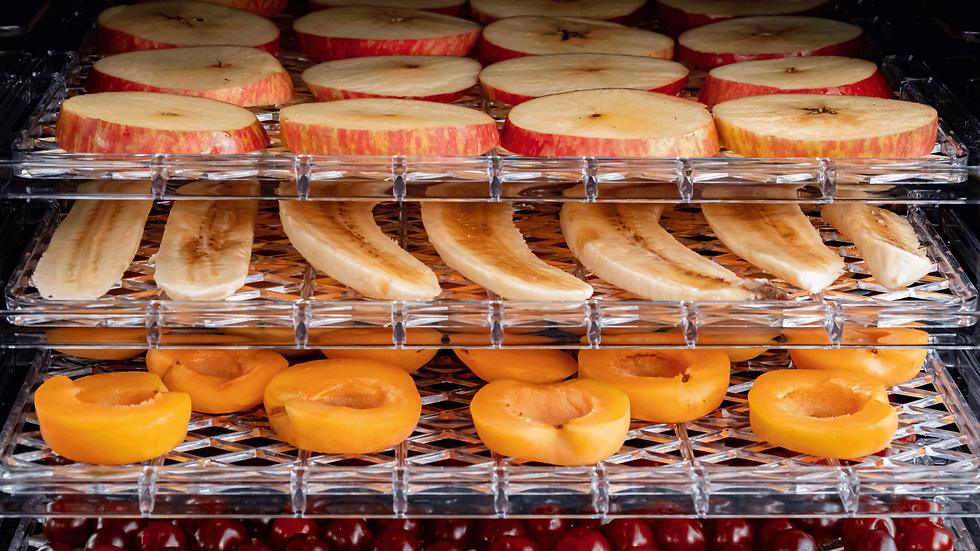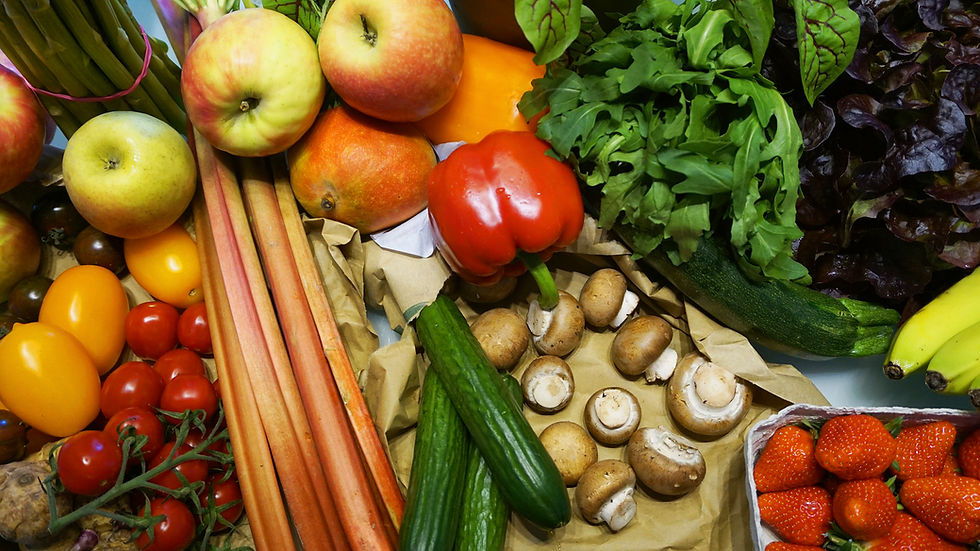What Fruits Should Not Be Dehydrated?
- Walid
- Jul 29, 2025
- 6 min read
Understanding the Risks of Dehydrating Certain Fruits
When it comes to preserving fruits, dehydration is a popular method, but not all options are advisable. Certain fruits not to dehydrate can pose health risks or result in unsatisfactory texture and flavor. It's essential to understand which fruits can withstand the process and which ones might spoil or lose their nutritional value. Commonly overlooked are strawberries, watermelon, and citrus fruits, which can lead to unexpected results when dehydrated.

Fruits That Lose Nutritional Value
Many fruits not to dehydrate, such as bananas and apples, may lose their antioxidants and vitamins through the dehydration process. This can be particularly concerning for health-conscious individuals who wish to retain the full nutritional benefits. Understanding fruit composition is crucial for making informed decisions about dehydration methods.
Texture and Taste Issues
Another critical factor to consider is the texture and taste of dehydrated fruits. Some fruits, like grapes, may turn into unappetizing raisins when dehydrated. Others, including kiwi and peach, suffer from mushiness or a lack of flavor. Recognizing these texture issues can save you from disappointing snacks.
Strawberries
Watermelon
Citrus Fruits
For your reference, here’s a table highlighting fruits and their dehydration viability:
Fruit | Dehydration Viability |
Bananas | Not Recommended |
Apples | Not Recommended |
Grapes | Not Recommended |
Know Before You Dehydrate
Before dehydrating any fruit, it’s crucial to research its compatibility with the process. Avoiding fruits not to dehydrate ensures you maintain both quality and nutrition in your snacks.
Explore more insightful articles like this one – we have plenty more for you to discover here!
Research the fruit's nutritional profile.
Consider texture and taste post-dehydration.
“Dehydration may seem simple, but knowing which fruits to avoid makes all the difference!”
The Impact of Dehydration on Flavor Profile of Fruits
Dehydration dramatically alters the flavor profile of fruits, transforming their fresh, bright tastes into a more concentrated experience. While some fruits thrive through dehydration, not all can handle this process. In fact, there are specific fruits not to dehydrate due to potential loss of flavor and texture. Understanding how dehydration impacts various fruits can guide your decisions when preserving your favorite snacks.

Why Dehydration Matters
The dehydration process removes moisture, intensifying flavors in fruits like apples and bananas. For those fruits not suitable for dehydration, the results can be quite the opposite. Fruits with high water content, like watermelon and oranges, tend to lose their essence and can become unpalatable when dried. It’s essential to know which fruits to avoid dehydrating to ensure a delightful taste experience.
Fruits Not to Dehydrate
Here are some fruits that you should consider avoiding during the dehydration process:
Watermelon
Oranges
Strawberries
Blueberries
Peaches
Fruit | Flavor Impact |
Watermelon | Loss of sweetness |
Oranges | Bitterness increases |
Strawberries | Changed texture |
Conclusion
Choosing the right fruits for dehydration can significantly influence your snacking experience. Always consider the flavor and texture before committing to the process. By being aware of the fruits not to dehydrate, you can enjoy the best that nature has to offer.
Embrace the vibrant flavors of fresh fruits—some are best enjoyed as nature intended!
Texture Changes: Fruits Not to Dehydrate
When it comes to preserving fruits, knowing which ones to dehydrate is crucial. While dehydration can enhance the shelf-life and flavor of many fruits, some undergo undesirable texture changes that can ruin the experience. Therefore, understanding which fruits not to dehydrate will help you maintain their delicious characteristics. Fruits that become overly tough or rubbery after dehydration can lead to a disappointing snack, making it essential to be informed.

Fruits to Avoid
Certain fruits are notorious for not holding up well during dehydration. For instance, watermelon transforms into a chewy, leathery texture that is far from its refreshing original form. Similarly, fruits like grapes turn into raisins, losing their juicy appeal, which may not be wanted by everyone. Ensuring the right texture in your snacks is key, so it's essential to consider these texture pitfalls when choosing fruits.
List of Fruits Not to Dehydrate
Watermelon
Strawberries
Grapes
Celery
Cucumbers
These fruits don't dehydrate well, making them less than appetizing. This means they will not provide the texture and flavor you may expect from dried fruits.
Fruit | Texture After Dehydration |
Watermelon | Chewy, leathery |
Strawberries | Hard, crunchy |
Grapes | Raisins, dry |
Alternative Fruits
If you're looking for succulent options that dry well, consider fruits like apples or pears. These retain their delightful taste and texture much better through the dehydration process.
Apples
Pears
Knowing which fruits not to dehydrate can save your taste buds from disappointment.
Avoid These Fruits for Successful Dehydration
When considering the process of drying fruits, it's crucial to know which fruits not to dehydrate. Some fruits retain too much moisture, resulting in spoilage and a less satisfying flavor. Particularly, fruits high in water content can ruin your efforts. Understanding the right selections will ensure a successful dehydration experience.

Fruits High in Moisture
Certain fruits are notorious for their high moisture levels, making them unsuitable for drying. Watermelon, for instance, contains about 90% water. This means that even when dehydrated, you may only end up with an unappealing mix of chewy, rubbery bits. Similarly, fruits like strawberries can lose their texture and flavor when dehydrated improperly.
Acidic Fruits
Acidic fruits may also pose challenges during the dehydration process. Citrus fruits such as oranges and lemons can be tricky, as their acidic nature may alter the final product's taste, leading to a sour and unpalatable outcome. Thus, these are not ideal for dehydration if you desire a sweet, concentrated fruit snack.
Watermelon
Strawberries
Oranges
Grapes
Fruit | Water Content (%) | Suitable for Dehydration |
Watermelon | 90 | No |
Strawberries | 91 | No |
Oranges | 86 | No |
Grapes | 80 | No |
Conclusion
Ultimately, being aware of fruits not to dehydrate can enhance your drying journey. The right choices lead to delicious snacks and less waste. Make informed selections to maximize your results!
Explore more insightful articles like this one – we have plenty more for you to discover here!
Remember, choosing the right fruits is key to a successful and enjoyable dehydrating experience.
Creative Alternatives to Dehydrating Problematic Fruits
Not all fruits are suitable for dehydration, and some can turn mushy or lose their flavor in the process. When considering fruits not to dehydrate, you might think of strawberries or watermelon. Instead of drying, explore innovative alternatives for preserving their freshness and taste. Various cooking methods or preservation techniques can enhance your culinary experience without compromising the flavor and texture of these fruits. Here is our full list of products.

Cooking Techniques
Instead of drying, why not consider cooking methods? Stewing fruits like peaches and pears can create a delectable sauce, while roasting can bring out complex flavors. You can also poach these fruits in simple syrups. Such methods not only retain moisture but also add a delightful twist to traditional dishes. If you are looking for efficient solar cables, we offer a wide range of durable models for different installation environments.
Freezing for Freshness
Freezing is another excellent alternative to dehydration. Fruits such as ripe bananas and blueberries freeze beautifully, maintaining their taste and nutrients. For best results, wash and chop your fruits beforehand, then lay them flat on a baking sheet to freeze individually. Afterward, store them in freezer bags for easy access.
Make fruit compotes or chutneys.
Create smoothies with frozen fruit and yogurt.
Preserve using high sugar with jams.
Fruit | Best Alternative |
Strawberries | Freezing / Jam |
Watermelon | Juicing / Smoothies |
Flavorful Combinations
Combining these fruits with spices or citrus can make them even more appealing. Adding a sprinkle of cinnamon to baked pears or lime juice to fresh fruit salads can elevate your dishes. Experiment with different pairings for an exciting twist!
Cinnamon with cooked apples.
Mint with watermelon salsa.
Citrus zest on blended smoothies.
“Preserving fruits in creative ways ensures you enjoy their full flavor – without the fuss of dehydration! Explore more insightful articles like this one – we have plenty more for you to discover
Your FAQs on Fruits Not Suitable for Dehydration
Understanding which fruits are not suitable for dehydration can save you time and effort in your food preservation journey. While many fruits can be dehydrated for a nutritious snack, some simply don't hold up well to the process. Fruits not to dehydrate often include those that are high in moisture, sugar, or are too soft, which can lead to spoilage or an undesirable texture once dried.
Here is our full list of products.

What makes fruits unsuitable for dehydration?
Fruits that contain a high water content, such as watermelon and cucumbers, do not dehydrate well. The reason is that they tend to retain moisture, becoming mushy or even spoiling during the drying process. Additionally, fruits like bananas might brown undesirably, losing their appeal and taste.
Examples of fruits not to dehydrate
It's crucial to consider various factors before deciding to dehydrate fruits. Below is a list of fruits that are typically not suitable for dehydration:
Watermelon
Cucumber
Strawberries
Oranges
Grapes
Dehydrating fruits can be an excellent way to preserve their flavor, but knowing which fruits not to dehydrate is equally essential.
Fruit | Reason |
Watermelon | High water content |
Cucumber | Mushy texture |
Strawberries | Browning issues |
How to choose the right fruits for dehydration
When selecting fruits for dehydration, opt for those with lower moisture content and greater firmness. This choice will ensure they retain their taste and texture while being dried. Always remember to wash and slice fruits properly to prepare them for the dehydration process.
Choose firm fruits
Opt for low-moisture varieties
Prepare properly by washing and slicing
When it comes to dehydration, knowing which fruits not to dehydrate can enhance your snack experience significantly.




Comments